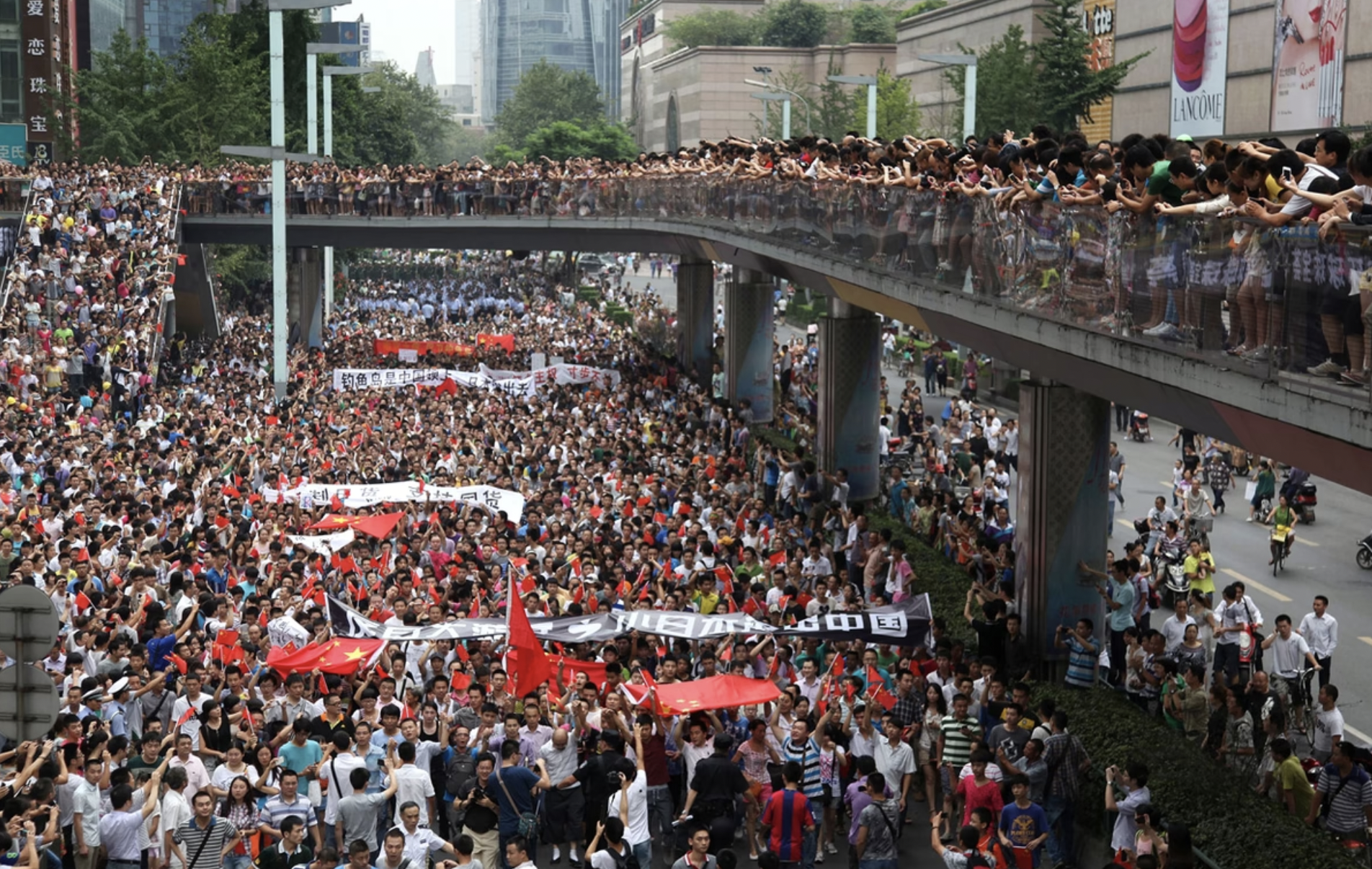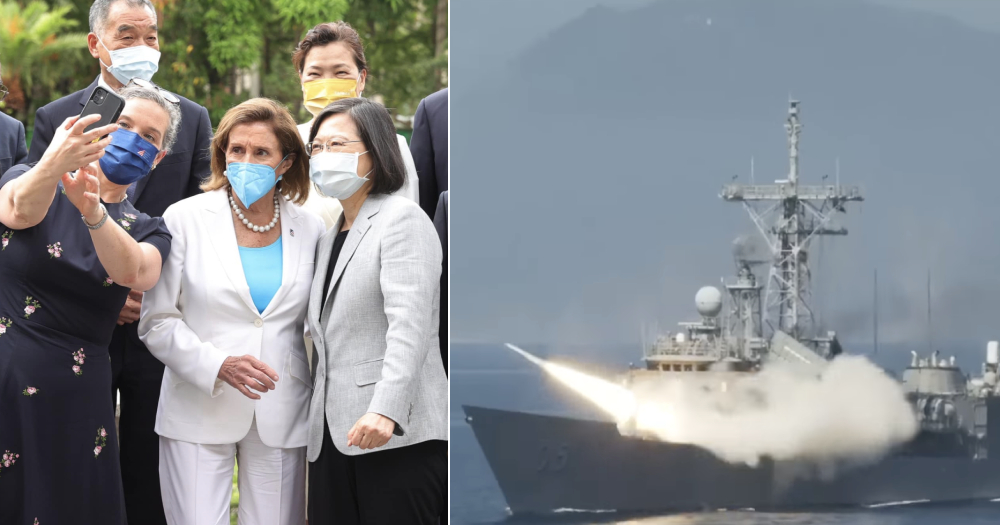Follow us on Telegram for the latest updates: https://t.me/mothershipsg
U.S. House Speaker Nancy Pelosi has wrapped up her Asia tour with a visit to Japan, having flown from South Korea.
China expresses its displeasure
In retaliation for her visit, China has launched six live-fire drills in the waters around Taiwan on Thursday (Aug. 4), unsubtly sending a message that it has surrounded the island.
Besides Taiwan, who called the move "highly provocative", and said the drills amount to a "blockade" on the island, China's actions have earned protests from Japan as well.
Our government & military are closely monitoring China's military exercises & information warfare operations, ready to respond as necessary. I call on the international community to support democratic Taiwan & halt any escalation of the regional security situation. pic.twitter.com/uAoDAU2bMV
— 蔡英文 Tsai Ing-wen (@iingwen) August 5, 2022
The Japanese defence ministry said five ballistic missiles had landed in the country's exclusive economic zone, with four out of the five having been fired by China over Taiwan's main island.
The exercises are also held particularly close to Taiwan's shoreline, with an exercise zone being set just 9 nautical miles (16.7km) from Taiwan's southwestern coast, where the port city of Kaohsiung is located nearby.
Just in case anyone wonders why five missiles launched by China fell into Japan’s exclusive economic zone. pic.twitter.com/QS5u1GCupx
— Duan Dang (@duandang) August 4, 2022
Unprecedented military drills meant to change the status quo
Meng Xiangqing, a professor at Beijing's National Defense University, told China Central Television, as cited by Bloomberg, that this was "a clear signal" to Taiwan that current drills have "exceeded all previous ones in scale and deterrence".
These unprecedented live-fire drills are an attempt to change the status quo in the Taiwan Strait, U.S. Secretary of State Antony Blinken said on Friday (Aug. 5) at a regional summit in Cambodia, according to Time.
Blinken also reportedly said, according to an official in attendance, that there is no justification for this move from China in response to what he called a "peaceful" visit from Pelosi.
Bonnie Glaser, director of the Asia Program at the American think tank German Marshall Fund, had made the same observation as well, saying that these military manoeuvres by China are meant to influence people into thinking that Taiwan "paid too high a price" for a mere visit, much like the aftermath of the then-Japanese PM Yoshihiko Noda's decision to buy the Senkaku islands in 2012.
The actions that China is taking now are intended to drastically shift the status quo in BJ's favor. Think 2012 Senkakus and 2015-16 South China Sea. Many will look back on this visit and say that Taiwan paid too high a price.
— Bonnie Glaser / 葛來儀 🇺🇦 (@BonnieGlaser) August 4, 2022
The decision to nationalise the islands was made then to fend off then-Tokyo governor's plan to buy the islands, who indicated his plans to develop them, even placing members of Japan's Self-Defense Forces there -- a move that would no doubt invite more severe diplomatic repercussion.
Anti-Japanese demonstrations that broke out in China at that time saw several Japanese cars and businesses attacked by protesters.
China had sent ships to the area and threatened trade sanctions at the time as well.
 Thousands of Chinese protesters in Chengdu, Sichuan province on Aug. 19, 2012. (Image via STR/AFP/Getty Images)
Thousands of Chinese protesters in Chengdu, Sichuan province on Aug. 19, 2012. (Image via STR/AFP/Getty Images)
To get a better sense of how cross-Strait tensions might play out, we spoke to Chen Ching-Chang, a Professor of International Politics at Japan's Ryukoku University, who explained via email the possible implications of the series of actions that China has taken against Taiwan.
Among the many points he made, he opined that China is expected to ramp up its punitive measures on Taiwan.
This is an opinion that's shared by other analysts who said Beijing had "backed itself into a corner" with its heightened rhetoric, and would have to up the ante significantly if it did not want to lose credibility.
Here are his answers published in full.
Are the live-fire naval drills, which are supposed to end on Aug. 8, meant to be "practice" for an actual blockade?
Chen: The designated sites are close to important sea routes and major ports, and together they can be interpreted as a rehearsal of a "real" blockade should Beijing decide to pursue "armed unification".
But we should not overlook the fact that China's neighbours, including Taiwan, are also using these opportunities to collect intelligence about Chinese missiles and artillery pieces. Coercion is a dynamic and dialectical process. It's not only a muscle-flexing show of the People's Liberation Army (PLA).
I would also note that Pelosi's visit to Taiwan involved complex coordination and communication between the U.S. and Taiwanese forces. China's reactions actually facilitated closer military exchanges between the two, which would complicate its military solution of the Taiwan issue.
Would China’s punitive actions get worse?
Chen: Yes. Even though the de facto military blockade is scheduled to end on Sunday, Beijing has started a series of (de facto) economic sanctions and likely cyber attacks. These measures will not stop next week and are likely to continue for months and years.
Beijing is likely to exert greater pressure on both foreign entities (in case they follow the U.S. Speaker or elevate relations with Taiwan) and Taiwanese businesspeople in China.
When the Japanese government nationalised the Senkaku Islands in September 2012, Beijing was also very furious. Chinese diplomats even described Japan as "Lord Voldemort" from the "Harry Potter" series seeking to revise postwar international order. The bilateral relationship was rocky for at least four to five years.
Since 2012, however, Chinese public vessels have been present in the disputed islands’ contiguous zone or even within a 12-nautical mile distance on an almost daily basis.
This can be seen as a predecessor of the Chinese air force’s now daily intrusion of Taiwan’s southwestern air defence identification zone (ADIZ). We should not be surprised if China’s punitive actions against Taiwan also last for five years or so, while recognising that some activities might become somehow permanent.
How far is China willing to go to follow through on its warnings and stand up to the U.S. on this matter?
Chen: Unlike a Russian idiom that dismisses "China's final warnings" as mere bluffs, I think this is not a matter of will, but capability.
But even before China can acquire sufficient anti-access/ area-denial capabilities, there are many non-war grey areas that it has been exploiting.
For example, launching disinformation campaigns on SNS (social networking services) to discredit Taiwan’s democratically elected government or to undermine the Taiwanese public’s morale in time of crisis.
If the public opinion turns against the U.S., Washington will not have the moral authority to intervene in a Taiwan Strait crisis.
There are some who say that the U.S. is showing its allies that it doesn’t mind risking Taiwan’s security for the sake of sending a statement to China.
Do you think this trip caused more harm than good to Taiwan and the U.S.?
Chen: No, I don’t think so.
The White House is clear that the Congress is an independent branch of the U.S. government on which it can’t control, and this message is not missed by the Japanese media.
Moreover, human rights diplomacy has been an important element in postwar U.S. foreign policy. Without political leaders like Pelosi to confront human rights abusers, the U.S. government will be more vulnerable to charges of hypocrisy and double standards.
Rather than saying her visit has risked Taiwan’s security, I think Beijing should not have securitised this event in the first place.
I am using the Copenhagen School’s securitisation theory that entering a state of exception is generally not preferable and it’s better to desecuritise the issue and bring it back to the normal political processes.
In other words, Beijing should have treated Pelosi as a legislator, not as if she was a top official representing the executive branch.
Of course, the timing of doing so has passed, and Beijing’s fury is not free —all punitive measures cost money at a time when the country’s GDP is in decline, provincial banks are on the brink of collapse, and civil servants face salary cuts. Sanctions against Taiwan harm the two sides of the Strait.
While in the short term, the harm for Taiwan is not inconsequential, ironically, China’s actions (before and after the U.S. Speaker’s visit) have internationalised the so-called Taiwan issue and more and more democratic countries are concerned if Taiwan will become the next Ukraine.
Read more
Top image adapted via Tsai Ing-wen/Facebook
If you like what you read, follow us on Facebook, Instagram, Twitter and Telegram to get the latest updates.
